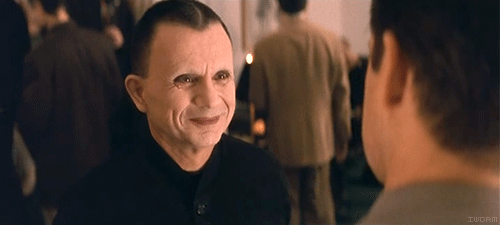
Lost Highway is one of David Lynch's most brilliant films, and yet its a puzzle wrapped in a mystery sitting deep inside an enigma. This is due to the fact that in many ways Lynch is musing about memory and how fragmented the past truly can be, yet also because Lynch operates as if he his putting dreams and nightmares on display. In this case that is especially true since this movie is really two halves centered around similar events and people while on the surface appearing to display only weakly tangibly linked.
The first half concerns itself with a jazz musician played expertly by Bill Pullman, who is dealing with a stormy troubled marriage to a gorgeous blonde, played by Patricia Arquette who he suspects is having an affair. What transpires next is a mix of the tragic, film noir, and the bizarre. The film oddly switches over to another tale, one of a young man in over his head with-get this-a gorgeous troubled blonde, also played by-well, Patricia Arquette. Both stories blend together, making the truth and the film's reality completely blurred in typical Lynch fashion, as Lynch is not content to merely display the movie in a linear fashion-the famous Talking Heads' lyric "Stop making sense" applies here.
Never minding the attempts to truly sort out the movie's twisty narrative, its rather astounding how Lynch handles such complex material. Really though at the same time Lost Highway is also him giving way to his most basic desires as a filmmaker, letting loose and in the process creating a rather bold and brashly unique movie that many critics didn't either get or failed to understand altogether. That such a different vision, fueled and inspired by the classic film noir Detour and other staples of the genre was misread is not surprising; Lynch has been an outsider ever since Dune in the 1980s.
Truth is relative, subject to differing opinions and resting on quicksand, despite our attempts to capture what we believe to be reality through pictures and videotapes. Pullman's Fred Madison tells a cop that "I like to remember things my own way," that he forms memories by, to also quote him, "How I remembered them. Not necessarily the way they happened." In this sense, Lynch manages to actually cover a subject matter that was touched upon merely four years later by Christopher Nolan in his equally fantastic neo-noir Memento. How we see the past can potentially impact the future, yet it always seems that we neglect the present truth for reasons that only we can remotely understand or comprehend. That's the genius of Lost Highway. 100
No comments:
Post a Comment